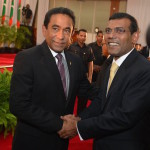Two years after the current Maldivian government assumed power, democracy most certainly has not become ‘the only game in town’, writes Azra Naseem for Himal magazine.
“Ample evidence has emerged during this short period that other currencies of power, deeply embedded in socio-cultural norms formed over centuries of varying types of authoritarian governance, are still very much in circulation in the country. These forms of power most clearly and commonly manifest as clientelism and patriomonialism, where power is exercised through informal networks based on political favours, connections between friends, family and a clique of elite individuals and groups. Such networks of informal power exist in perpetual tension with the official institutions of democracy. In the Maldives, they have created an atmosphere that discourages popular participation, makes a mockery of the rule of law, renders problematic the delivery of public services, discourages both domestic and foreign investment, and is highly conducive to corruption, rent-seeking and other forms of abuse.
“Three months into 2010, the Majlis passed a no-confidence motion against the then-auditor general, Ibrahim Naeem, over allegations of corruption. Naeem was at the time involved in high-profile investigations of members of the former regime for alleged embezzlement of millions of (US) dollars from state funds. The charges, for which the Majlis eventually removed Naeem from office, accused him of using a state credit card to buy a tie and charter a boat for a domestic trip. All MPs from the ruling Maldives Democratic Party (MDP) voted against the motion, but former President Gayoom’s Dhivehi Rayyithunge Party (DRP) holds the Majlis majority, with the People’s Alliance, led by Gayoom’s brother, MP Abdulla Yameen. Several MDP MPs alleged the accusations against Naeem were politically motivated, but without a Majlis majority, failed to prevent Naeem’s removal from office. With Naeem gone, the cases he was investigating disappeared from the public domain.
“Both the law community and the media have been notably lax in taking issue with the lack of an independent judiciary. This silence exposes the most inexplicable features of the Maldives’ new democracy; it is also one of its most dangerous. The Maldivian media is an interesting beast, the make-up and characters of which is yet to be analysed in any depth despite the explosion in media outlets and output with the transition to democracy. It was only recently, in February this year, that the Maldives Media Council, established in May 2010, got around to adopting a code of ethics for the country’s media professionals. Prior to this, only the state-owned broadcaster, MNBC, possessed a written code of ethics, and that was only published in mid-2010.
“Very interesting in the context of media-judiciary relations is a provision in the Media Council’s Code of Ethics banning the media from publishing any material that contradicts or questions the findings of an official investigative body or the ruling of a court. Only legal or professional experts or academic analysts are allowed to publish such commentary, according to the Code. This raises two possibilities: the Maldivian Media Council does not regard local journalists as professionals with the ability to critique or question a court ruling; or two, it regards court rulings as beyond scrutiny.





